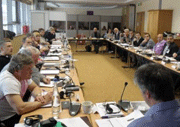UNI Europa affiliates meet on Information and Consultation

The conference was sponsored by UNITE the Union and trade unions from Belgium, Germany, Netherlands, UK, Poland, Hungary, Switzerland, Sweden, Spain and Italy attended the seminar.
The conference, the first of its kind to examine national information and consultation, demonstrated Unite the union’s commitment to both extending the coverage of information and consultation agreements across Europe and to strengthening existing European and national level arrangements.
The conference was opened by the AGS of Unite Tony Burke who said in his opening speech that employers are looking at ways of dismantling the information and consultation laws, he also said we need to ensure that EWC’s are not just ‘talking shops’
Throughout the conference delegates repeatedly highlighted both the social and business case for employers and workers establishing meaningful information and consultation bodies, and for employers to properly engage in this process.
While proper workplace information and consultation lies at the heart of the European social model, conference delegates highlighted the huge disparities between existing European systems of information and consultation, meaning that millions of workers are excluded from the benefit of Directive 2002/14/EC. Conference notes that without a level playing field, in relation to member states’ national legislation, this existing deficit of workplace democracy will continue.
Conference condemned the opportunistic attacks by European governments, such as in Spain, on worker’s rights. Delegates expressed their opposition to these actions which represent an assault on the basic rights at work, rights that should be enjoyed by all citizens.
Conference deplores those employers who show complete disregard for existing information and consultation bodies and calls on national governments to monitor such companies and ensure their compliance. In their discussions, conference participants highlighted the need for proper sanctions for employers failing to adhere to their national legislation. Although sanctions are supposed to be dissuasive by their very nature, in too many European countries, they are not and conference calls on European trade unions, and their federations, to ensure that the provisions at national level include sanctions that are fit for purpose.
Conference agreed that the exchanges of information and experience between EU states, individual trade unions and between information and consultation representatives themselves must continue into the future. Consequently conference demands that Uni Europa, and its affiliated trade unions, organises similar events in the future to highlight the importance of information and consultation and the weaknesses in national provisions.
On their return, participants at the conference will be required to ensure that their national legal provisions are applied as widely and as comprehensively as possible and document any evidence of non compliance by employers to demonstrate the weaknesses of existing information and consultation machinery to their national governments and the European Commission.
Finally, as a result of the compelling evidence, that current information and consultation arrangements are fundamentally flawed, conference calls on the European Commission to address this by revising Directive 2002/14/EC, by working with the European trade union movement to ensure the principles at the heart of the European social model become a reality for Europe’s citizens.
Further information, Nicola.konstantinou@uniglobalunion.org

